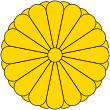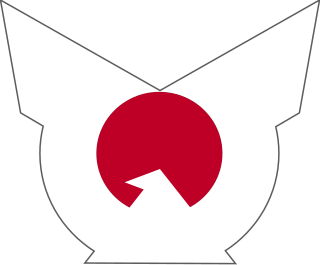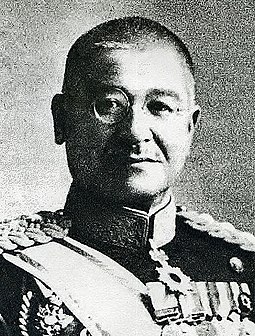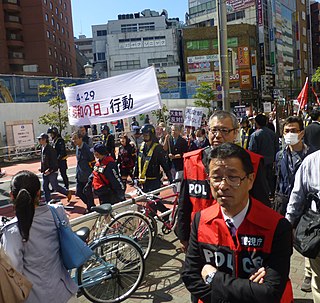
Shōwa Day is a Japanese annual holiday held on April 29. It honors the birthday of Emperor Shōwa (Hirohito), the reigning emperor from 1926 to 1989. Shō (昭) means “shining” or “bright”, and wa (和) means “peace”, signifying the "enlightened peace" that citizens receive. According to the now defunct Democratic Party of Japan, the purpose of the holiday is to encourage public reflection on the turbulent 63 years of Hirohito's reign.
The League of Diet Members Supporting the Prosecution of the Holy War was a political party coalition in the lower house of the Diet of Japan formed on March 25, 1940, with the backing of the Imperial Japanese Army as a reaction against a speech made by Saitō Takao, of the Rikken Minseitō critical of the government’s aggressive policies in the Second Sino-Japanese War.
Events in the year 1946 in Japan.
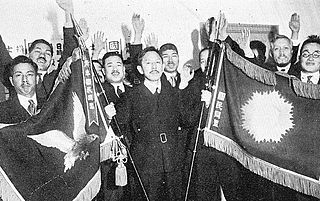
Kokumin Dōmei was a Japanese fascist political party in Japan active in the 1930s.

Fumio Gotō was a Japanese politician and bureaucrat, and briefly served as interim Prime Minister of Japan in 1936.
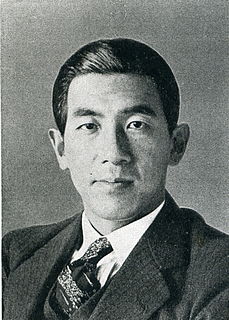
Takeru Inukai was a Japanese politician and novelist active in Shōwa period Japan. Also known as "Inukai Ken", he was the third son of Prime Minister of Japan Inukai Tsuyoshi.
The Liberal Democratic Party of Japan is the ruling party of Japan, with Party President Shinzō Abe being the Prime Minister of Japan. The Liberal Democratic Party is characterized by factionalism, where factions are sub-groups within a larger organisation. While factions characterize other political parties in Pacific Asia, Japanese factionalism is distinguished by its stability and institutionalization. Since the genesis of the Liberal Democratic Party in 1955, factions have existed, but they have changed over time. Despite this change, factions in the party today can be traced back to their 1955 roots, a testament to the stability and institutionalized nature of Liberal Democratic Party factions.

Ryūtarō Nagai, was a politician and cabinet minister in the Empire of Japan, serving a member of the Lower House of the Diet of Japan eight times, and four as a cabinet minister. He was noted in his early political career as a champion of universal suffrage, social welfare, labor unions, women's rights and Pan-Asianism.

Tsuneo Kanemitsu, was an entrepreneur, politician and cabinet minister in the Empire of Japan, serving eight terms as a member of the Lower House of the Diet of Japan, and twice times as a cabinet minister. He also served twice in the post-war Lower House of the Diet.

Hiroya Ino, was a politician and cabinet minister in Japan, serving once as a member of the Lower House of the pre-war Diet of Japan, and three times as a member of the post-war House of Councillors. He also held cabinet-level posts three times.
The Imperial Rule Assistance Political Association, abbreviated to Yokuseikai or IRAPA, was the political wing of the Imperial Rule Assistance Association and a joint caucus of both the House of Representatives and the House of Peers that existed between 20 May 1942 to 30 March 1945.

Bukichi Miki was a Japanese politician. He was a close friend and ally of Ichiro Hatoyama, and was the key figure in carrying out the "conservative merger" that resulted in the formation of the Liberal Democratic Party.
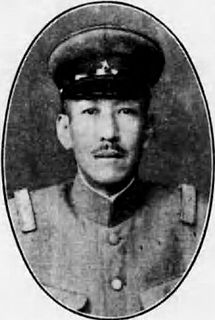
Kisaburō Andō was a career officer and lieutenant general in the Imperial Japanese Army, who served as a politician and cabinet minister in the government of the Empire of Japan during World War II.

Michio Yuzawa was a bureaucrat and cabinet minister in early Shōwa period Japan.

Hideki Tojo was a Japanese politician and general of the Imperial Japanese Army (IJA) who concurrently served as the Imperial Rules Assistance Association's leader and 27th Prime Minister of Japan during much of World War II. He was among the most outspoken proponents for preventive war against the United States before the attack on Pearl Harbor and one of the leading perpetrators behind Japanese war crimes against prisoners of war and civilians during the Pacific conflict. After the end of the war, Tojo was arrested, condemned and sentenced to death by the International Military Tribunal for the Far East, and hanged on December 23, 1948.
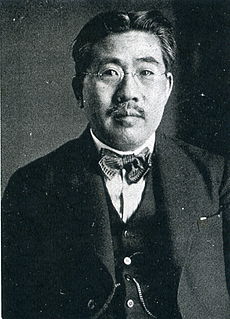
Etsujirō Uehara was a politician and bureaucrat in the early Shōwa period Japan, who subsequently was a politician and cabinet minister in the immediate post-war era.

Tatsunosuke Yamazaki was a Japanese was a politician and cabinet minister in the Taishō and early Shōwa periods of the Japan. His brother, Iwao Yamazaki was also a politician and cabinet minister, and his nephew Heihachiro Yamazaki was later a prominent member of the post-war Liberal-Democratic Party.
